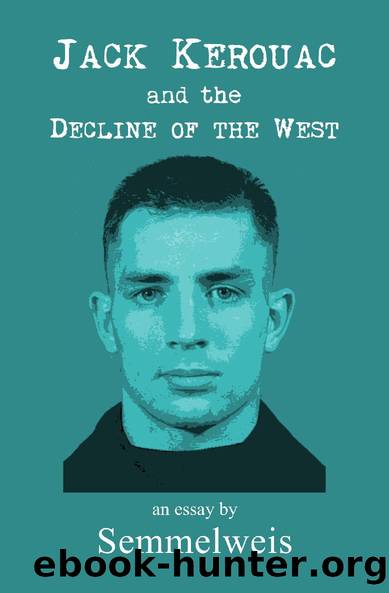Jack Kerouac and the Decline of the West by Semmelweis

Author:Semmelweis
Language: eng
Format: epub
Published: 2020-07-20T07:00:00+00:00
4.
Kerouac and Ginsberg
In Vanity of Duluoz Kerouac writes about the first time he and Allen Ginsberg met. “One look at him, a few days of knowing him to avouch my private claim, and I came to the conclusion he was a lecher who wanted everybody in the world to take a bath in the same huge bathtub which would give him a chance to feel legs under the dirty water. This is precisely the image I had of him on first meeting.”[21] Nonetheless, in spite of Kerouac’s initial impression of him, he and Ginsberg became close friends, largely because both were writers and poets obsessed with their craft.
Neither Ginsberg nor Burroughs achieved the level of fame that Kerouac did in the late 1950s and early 1960s. This is partly because, of the three, Kerouac was the least counter-cultural, the least anti-American in sentiment and purpose. To the contrary, he had a deep love of America as land, as place — On The Road is basically a prose love poem to America — which naturally translated itself into conservative political leanings, albeit of a nonconventional sort. (He famously watched the McCarthy hearings while getting high on marijuana and cheering for McCarthy.)
Burroughs and Ginsberg, on the other hand, found their true audience in the counter-culture of the mid to late 1960s. In contrast to Kerouac, neither had an instinct for patriotism — quite the opposite, in fact. Burroughs was a cynical nihilist for whom patriotism was simply one more “junk con,” — he famously described military men as simopaths: “a man convinced he is an ape or other simian” — while Ginsberg was a New York Jewish communist who grew up on radicalism and critical theory, a true child of the Frankfurt School. His famous poem “America,” published in Howl, is full of the sort of invective one still hears from leftists and SJWs to this day. In the 60s, Ginsberg became a leader of the hippie movement and promoted Eastern religions, psychedelic drugs, protest, “free love,” and gay liberation. Later, he became a member of the pro-pedophilia group NAMBLA, as well as a university professor in New York City (the former apparently poses no career limitations for the latter) where he was known for his sexual pursuits of his male students, confirming Kerouac’s initial impressions of him.
Burroughs likewise embraced 60s radicalism, though not with the same values as Ginsberg. A lifelong anti-liberal and gun enthusiast, he preferred violent revolutionary groups to hippy peace activists. Nonetheless, the counter-culture embraced him for his critique of bureaucracy, of white racism, and his open homosexuality, which often bordered on pedophilia — Burroughs was a “sexpat” who spent years living in the Third World in order to have easier access to drugs and teenage male prostitutes. Burroughs’ nihilism, in contrast to Ginsberg’s leftist idealism, later gave him an audience with the punk rock scene, on which he had a rather large influence.
The essential difference between Kerouac and the others was summed up by Jack in an
Download
This site does not store any files on its server. We only index and link to content provided by other sites. Please contact the content providers to delete copyright contents if any and email us, we'll remove relevant links or contents immediately.
The Death of the Heart by Elizabeth Bowen(3609)
East of Eden by John Steinbeck(3211)
Flowers For Algernon by Daniel Keyes(3099)
To Kill A Mockingbird by Harper Lee(2694)
Lord of the Rings by J.R.R. Tolkien(2547)
A Clockwork Orange by Anthony Burgess(2458)
I Capture the Castle by Dodie Smith(2034)
Scoop by Evelyn Waugh(1972)
Herbert, Frank - Dune 01 - Dune by Herbert Frank(1886)
LORD OF THE FLIES by William Golding(1843)
The Fountainhead by Ayn Rand(1828)
Tolkien, J. R. R. - The Hobbit by Tolkien J. R. R(1813)
The Catcher in the Rye by J.D. Salinger(1803)
Lucky Jim by Kingsley Amis(1744)
Animal Farm by George Orwell(1714)
Rebecca by Daphne Du Maurier(1669)
1967 - One Hundred Years of Solitude by Gabriel Garcia Marquez(1660)
Herbert, Frank - Dune 02 - Dune Messiah by Herbert Frank(1649)
Lolita (German) by Vladimir Nabokov(1590)
